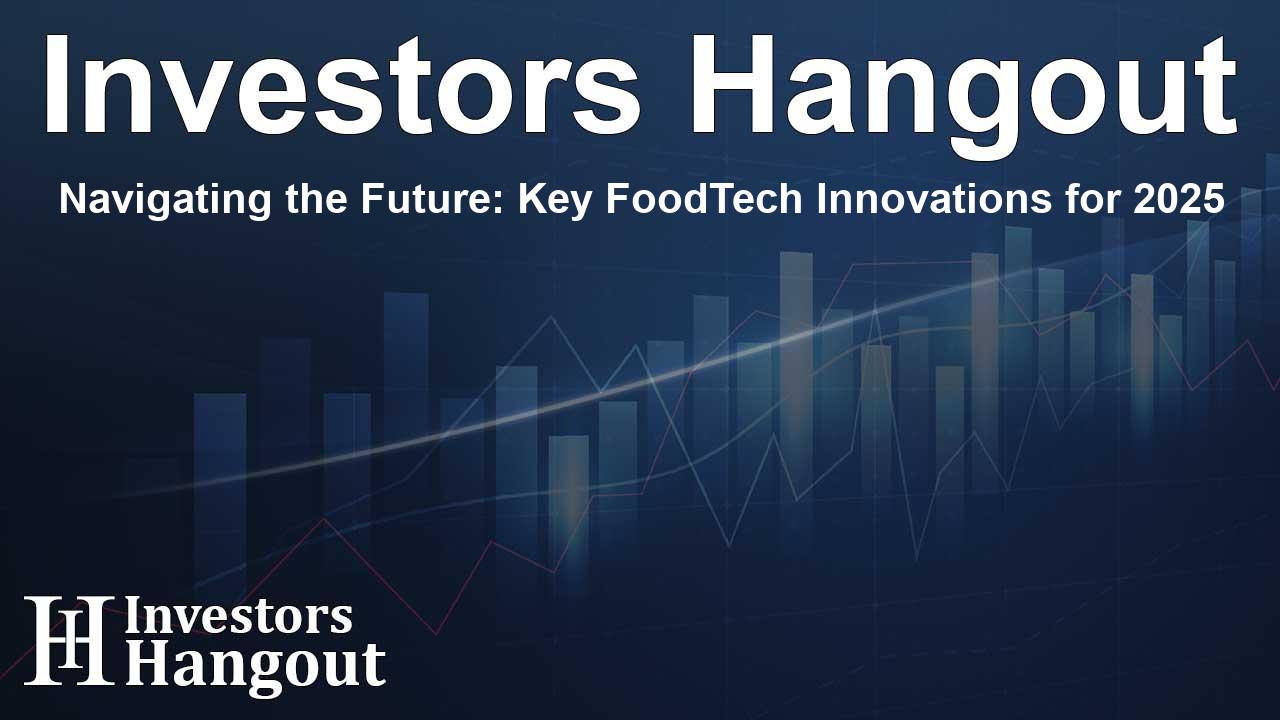Navigating the Future: Key FoodTech Innovations for 2025

Revolutionizing FoodTech: Insights into 2025 Trends
FutureBridge, a renowned techno-commercial advisory firm, has taken a close look at the emerging trends in the FoodTech space. As we approach 2025, the industry finds itself at a crucial juncture—where technological advancements are matched by shifting consumer needs. To thrive in this rapidly changing environment, companies must be agile and innovative to meet the expectations of stakeholders and regulatory frameworks.
Driving Innovation in Food and Beverage
Food and beverage companies are called to action as they rethink their product offerings. A significant percentage, nearly 40%, of companies within the UK anticipate an increase in research and development investments as they strive to adapt. The emphasis is now on innovative product reformulation and the repurposing of existing ingredients.
Challenges and Opportunities Ahead
As FutureBridge identifies key consumer and technology trends, several core challenges emerge: cost, taste, health, sustainability, and digitization. Addressing these factors is crucial as we look into 2025 and beyond.
Exploring Consumer-Centric Trends
- Emotional Eating: Modern consumers are looking for more than just physical sustenance. They are increasingly interested in foods that enhance mood and well-being. A staggering 75% of consumers seek energy-boosting functional foods, while 71% prioritize options that bolster mental health. This cultural shift is driving demand for ingredients that alleviate stress, including nootropics and adaptogens. Notably, the acquisition of Onnit by Unilever highlights this trend.
- Nutrition Across Life Stages: The market for targeted nutrition at various life stages beyond infancy and senior years remains largely underexplored. The growing health consciousness among consumers has amplified interest in specialized ingredients, ranging from magnesium to menstrual relief solutions. Nestlé's Health Science division has recognized the significant market opportunity in this area.
- Upcycling Materials: With sustainability concepts gaining legal traction related to global goals, efforts are underway to curtail food waste by 50% by 2030. Upcycling food and agricultural waste using innovative technologies such as nanotechnology and fermentation opens new avenues for value creation. An example includes Hershey's investment in the startup BlueStripes, which converts cacao waste into usable products.
- AI in Consumer Understanding: Artificial Intelligence has emerged as a key player in discerning consumer preferences. Evidently, over half of all consumers believe that data sharing can benefit society, allowing brands to adopt a proactive rather than reactive approach. Samsung's advancements in emotional AI patents illustrate the competitive edge that such technologies can offer.
"The food landscape is undergoing rapid transformation, and businesses must create a clear strategy to keep pace with these changes. Our findings indicate that successful navigation of 2025 relies on understanding emotional wellness, personalized nutrition, sustainability, and leveraging AI for consumer insights," states Jaideep Raje, FutureBridge's Senior Vice President and Head of the Food & Nutrition Practice.
About FutureBridge
FutureBridge is a premier consulting and advisory firm specializing in techno-commercial perspectives. With an eye on the future, we assist Fortune 500 companies in navigating industry trends spanning 1 to 25 years ahead.
Frequently Asked Questions
What are the top FoodTech trends identified for 2025?
FutureBridge highlights trends focusing on emotional wellness, life-stage nutrition, sustainability efforts, and the integration of AI in understanding consumer needs.
How can food companies adapt to the changing market?
Companies can thrive by investing in innovative R&D, reformulating products, and leveraging consumer insights to stay ahead of industry trends.
What role does emotional wellness play in food consumption?
Consumers today are looking for foods that not only satisfy physical hunger but also contribute positively to their mood and mental health.
Why is sustainability important in food production?
Sustainability is increasingly becoming a requirement, driven by legal standards and the urgent need to reduce food waste globally.
How is AI changing marketing strategies in FoodTech?
AI enables brands to gain deeper insights into consumer behavior, allowing them to tailor offerings proactively based on emotional and functional needs.
About Investors Hangout
Investors Hangout is a leading online stock forum for financial discussion and learning, offering a wide range of free tools and resources. It draws in traders of all levels, who exchange market knowledge, investigate trading tactics, and keep an eye on industry developments in real time. Featuring financial articles, stock message boards, quotes, charts, company profiles, and live news updates. Through cooperative learning and a wealth of informational resources, it helps users from novices creating their first portfolios to experts honing their techniques. Join Investors Hangout today: https://investorshangout.com/
Disclaimer: The content of this article is solely for general informational purposes only; it does not represent legal, financial, or investment advice. Investors Hangout does not offer financial advice; the author is not a licensed financial advisor. Consult a qualified advisor before making any financial or investment decisions based on this article. The author's interpretation of publicly available data shapes the opinions presented here; as a result, they should not be taken as advice to purchase, sell, or hold any securities mentioned or any other investments. The author does not guarantee the accuracy, completeness, or timeliness of any material, providing it "as is." Information and market conditions may change; past performance is not indicative of future outcomes. If any of the material offered here is inaccurate, please contact us for corrections.